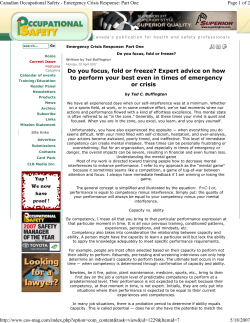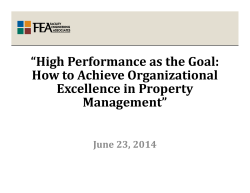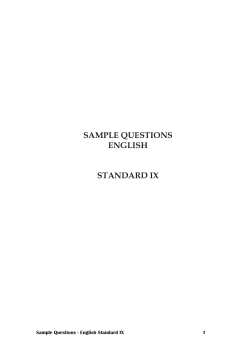
•
Learning Objectives • Pharmacists will be able to: – Discuss process utilized to reorganize pharmacist competencies across a ten-hospital system Title of Presentation Arial Regular 22pt Reorganization of Pharmacist Competencies across a Single line spacing Ten-Hospital System Up to 3 lines long – Determine topics of relevance by weighing high risk, low use, high use, or new procedures • Technicians will be able to: Date 20pts Author Name 20pts Author Title 20pts Rebecca A. Taylor, Pharm.D., MBA, BCPS Assistant Director Pharmacy Operations Marymount Hospital Assistant Professor Pharmacy Practice NEOMED taylorr3@ccf.org – List priority areas for pharmacist competencies. – Describe the importance of ensuring employees are competent. OSHP Competencies l May 2013 l 2 Definition • Competence is defined as the condition or quality of being well-qualified, fit or capable • According to The Joint Commission, a competent individual is one who has the “essential knowledge and skills necessary to perform a job and actually perform the job according to defined expectations” WHAT IS COMPETENCE? OSHP Competencies l May 2013 l 2 • Let’s review some pertinent standards http://www.hcahpsonline.org/home.aspx OSHP Competencies l May 2013 l 2 TJC Standards around Competency TJC Standards around Competency • HR.2.10: The hospital provides initial orientation • HR.2.30: Ongoing education, including in- • HR.3.10: Staff competency to perform job responsibilities is services, training, and other activities, maintains and improves competence – EP 1 Staff training occurs when job responsibilities or duties change – EP 3 “…appropriate to the needs of the population assessed, demonstrated, and maintained – EP 1 Based on population served – EP 4 Based on defined competencies that need to be assessed and reassessed on an ongoing basis, based on techniques, procedures, technology, equipment, or skills needed to provide care, treatment and services – EP 5 Based on a defined time frame for how often competence assessments are performed…minimally once in three year accreditation cycle and in accordance with law and regulation served” – EP 8 “…documented” OSHP Competencies l May 2013 l 2 OSHP Competencies l May 2013 l 2 1 Audience Participation TJC Standards around Competency • HR.3.10 (cont): Staff competency to perform job responsibilities is assessed, demonstrated, and maintained – EP 6 Competence assessment process is based on Duties change? assessment method (appropriate to determine the skill) – Media fill/Glove-tip testing for clean room staff – EP 7 Competence assessment is based on the use of qualified individuals to assess competency – How do you define this? – EP 8 Hospital assesses staff’s ability to carry out responsibilities safely, competently and in a timely manner upon completion of orientation – EP 10 When improvement activities lead to a determination that a person is unable or unwilling to improve, hospital takes appropriate action New Technology? OSHP Competencies l May 2013 l 2 OSHP Competencies l May 2013 l 2 What’s the bottom line What are the essential knowledge and skills for pharmacy? • Competency assessment, if done well, is very time- • Pharmacists consuming – If individuals are found not to be competent, must have a process in place to address – Verify medication orders accurately and – Adjust for patient-specific disease state – • Every time you add/change/modify a process you should be assessing & re-assessing competency • Should be based on demonstrated on-the-job observation (preferred), but can also use written, verbal tests or simulations • Should be done at orientation & periodically thereafter OSHP Competencies l May 2013 l 2 • Technicians – Prepare medications according to timely – factors Demonstrate knowledge of drug/drug interactions Provide drug information for healthcare providers and patients – Perform patient education & counseling – Optimize medication therapy regimens and plans label/mixture/recipe – Refill automated dispensing cabinet with – – – – correct medications Deliver medications to the patient/nurse Manage medication inventory/outdates Utilize technology to bar-code medications Provide customer service to nurses, physicians – Maintain clean rooms according to USP 797 – Utilize and optimize a medication formulary – Troubleshoot technology issues within medication use system – Ensure drug products are procured & safety stored – Coordinate discharge for patients – Provide alternatives for drug shortages OSHP Competencies l May 2013 l 2 Types of Competencies that most places have… • Renal dosing • • • • Pediatric dosing Geriatric dosing Anticoagulants Other high-risk medications REINVENTING THE BASICS • Medication safety OSHP Competencies l May 2013 l 2 OSHP Competencies l May 2013 l 2 2 Competencies pre 2009 Main Campus Technology trials • Utilized an internal learning management system • Purchased Adobe Presenter License (~$450) • Purchased audio-recording equipment (~$200) (COMET®) – Static text with pictures – Post-assessment – Difficult to obtain reports—manual process Software • Purchased several serial upgrades (~$300) • Sum Total®, a commercially available learning Hardware management system was also being trialed – Allowed for employee HR data feed – Simpler reporting/dashboard option for managers – Supported SCORM and Flash Training • Needed computers with better audio capability • Needed to store finished product on server (large size files) • Tested equipment/Implemented/Re-Tested • Trained end-users OSHP Competencies l May 2013 l 2 OSHP Competencies l May 2013 l 2 Demo Each competency is built like an online course • Short demo of Adobe Presenter finished product • SumTotal is similar to Angel® or Blackboard® in how it allows you to upload content and navigate as the “learner” • www.learning.ccf.org • Competency course layout – Pre-reading (review article, book chapter, pertinent evidencebased information) – Powerpoint slide set (for printing) – Adobe Presenter audio over slides (lecture) – Post-assessment (10 questions per 1 hour) – Continuing education certificate if applicable – Other links (to FDA, ISMP, handouts, internal protocols) OSHP Competencies l May 2013 l 2 How to choose competencies OSHP Competencies l May 2013 l 2 Insert Competency schedule CCHS table High risk Errors Low use TJC/other regulatory New process X X X X X 2011 (main only) 2012 2013 2014 2015 Insulin/U-500 Heart failure counseling Psychiatric medications Geriatric considerations Chemotherapy Anticoagulants Product formulations Electrolyte replacement Anticoagulants Renal dosing Profile Review Best Practices Renal dosing Hazardous drug waste Insulin Neonatal/Peds Live Core Curriculum (6 hrs) Neonate/peds Hypertonic saline AMI & Pneumonia Counseling OSHP Competencies l May 2013 l 2 OSHP Competencies l May 2013 l 2 3 Timeline of competencies Qualified content experts Education Manager Clinical Integration Team Representatives from all hospitals Q1: Jan-March Q3: July-Sept • Competency teams meet (34/year) • Course testing • Release to pharmacists Competency Team 1 Clinical Specialist Lead Q2: April-June • Final version to QA • Send to EEducation Team 7-9 other specialists and pharmacists Quality Assurance Committee 1 Drug Information Specialist Lead 5-6 other specialists, pharmacists, and drug information personnel OSHP Competencies l May 2013 l 2 Counseling checklists OSHP Competencies l May 2013 l 2 Challenges • Incorporating checklists with didactic material – IV room personnel still complete live checklists – Patient counseling has a checklist • Moving into electronic or live assessments in the computer system • What to do if someone doesn’t pass – Did they not pass due to a technology glitch? – Knowledge deficit? – Going too fast? • Do these courses actually assess competency? OSHP Competencies l May 2013 l 2 OSHP Competencies l May 2013 l 2 The continuum of competency IDP = individual development plan IDP* Mentor Application real-time Clinical baseline OSHP Competencies l May 2013 l 2 4
© Copyright 2025





















